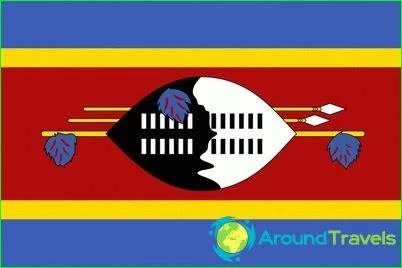Swaziland flag

The state flag of the Kingdom of Swaziland was officially approved in October 1967 a few months before the declaration of sovereignty.
Description and proportions of the flag of Swaziland
The Swaziland flag has a standard rectangular shape and a 3: 2 aspect ratio. The canvas is divided horizontally into five stripes, unequal in width. The Swaziland flag has dark blue stripes above and below, the central field is twice as wide as the blue fields and is dark red in color, and between these stripes are narrow fields of bright yellow. On the red part of the flag, at an equal distance from both the edges of the cloth and from the yellow stripes, an African shield is applied against the background of two spears and a staff, located horizontally and parallel to each other.
On the shield and staff, there are national symbols - decorative tassels made of bird feathers, which denote royalty. The red field of the Swaziland flag reminds of the battles and battles for independence and the lives of patriots given in this struggle. Blue stripes indicate the desire of the country's inhabitants to live in peace and prosperity, and yellow ones symbolize the wealth of Swaziland's bowels and its natural resources. On the shield that adorns the flag of Swaziland, there is a white and black painting, symbolizing good-neighborly relations between representatives of the two races in the country..
The African shield is also depicted on the coat of arms of Swaziland, which is decorated with figures of a lion and an elephant. The animals hold an azure-colored heraldic shield topped with a stylized crown with green feathers. It contains an image of an African shield with a spear and an arrow, and below there is a white ribbon with an inscribed word «Siyinqaba».
The Nguni shield with spears and arrows on the Swaziland flag is a totem that protects against enemies. The lion on the coat of arms symbolizes the king, and the elephant symbolizes the queen mother, whom the inhabitants of the country revere and respect.
The flag of Swaziland, according to the law of the country, can only be used by government agencies located on land and by land units of the country's armed forces..
History of the flag of Swaziland
The Swaziland flag was approved shortly before Great Britain granted the state full independence. Until 1968, the Kingdom of Swaziland was one of Her Majesty's colonial territories, and its flag was a blue cloth with the flag of Great Britain at the top of it..


